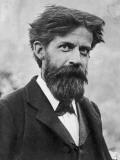|
|
|
|
|
Mahatma Gandhi
b. 10-2-1869; Porbandar, India
d. 1-30-1948
Mohandas Gandhi is best known for the non-violent means of revolution by which India was able to gain its independence. He also spoke of environmental issues.
• “Air, water and grains are the three chief kinds of food. Air is free to all, but, if it is polluted, it harms our health. Doctors say that bad air is more harmful than bad water. Inhalation of bad air is harmful by itself and this is the reason we [sometimes] need change of air. Next comes water. We are generally very careless about it. If we were to be sufficiently careful about air, water and food, the plague would never make its appearance among us.” (1918)
• “Nature is lenient. It often does not punish us for our sins immediately.”
• “...The spinning-wheel enables us to identify ourselves with cores. The millionaires imagine that money can bring them anything in the world. But it is not so. At any moment death might come and snuff them out…. Losing one's life…is not the same thing as shedding 'self'. One has to learn to efface self or the ego voluntarily and as a sacrifice in order to find God. The spinning-wheel rules out exclusiveness. It stands for all inclusiveness. It stands for all including the poorest. It, therefore, requires us to be humble and to cast away pride completely.”
• “There is a sufficiency in the world for man's need but not for man's greed.”
NEWS - ... an e-charkha, a hand-operated spinning wheel that produces yarn and generating enough electricity to store and to power up the specially-designed LED light source. [the kid powered pump]
• more Gandhi posters
|
|
|
|
Patrick Geddes
b. 10-2-1854; Scotland
d. 4-17-1932; France
Biologist Patrick Geddes, best remembered for his innovative thinking in the fields of urban planning and education, was interested in the science of ecology, nature conservation and deeply concerned about pollution. He is considered a forerunner of modern Green politics.
Both Geddes and Rene Dubos are credited as an author of a maxim “Think globally, act locally”.
|
|
|
|
Lois Gibbs
b. 1951
Lois Gibbs became involvement in environmental causes in 1978 when she discovered that her 7-year-old son's elementary school in Niagara Falls, New York was built on a toxic waste dump, and then that her entire neighborhood, Love Canal, had been built on top of this dump.
Her efforts to clean up the site and bring justice for the families made ill by the chemicals resulted in the Superfund.
|
|
|
|
Jane Goodall
b. 4-3-1934; London, England
Jane Goodall is a zoologist, primatologist (primates), ethologist (animal behavior), and antropologist (humans) best-known for her study of chimpanzee social and family life in Gombe Stream National Park.
|
|
|
|
Albert Gore, Jr.
b. 3-31-1948; Washington, DC
Environmental activist Al Gore was the US Senator for Tennessee (1985-1993), the 45th US Vice President (1993-2001) and shared the 2007 Nobel Peace Prize with the Intergovernmental Panel on Climate Change.
His documentary “An Inconvenient Truth” won an Academy Award in 2006.
Upton Sinclair quoted in Inconvenient Truth - “It is difficult to get a man to understand something when his salary depends upon his not understanding it.”
• See "An Inconvenient Truth" for free.
• Climatecrisis.net
|
|
|
previous page | top | next
ecologists | a | b | c | d | e | f | G | h | i-k | l | m | n-o | p | q-r | s | t-z
|
|
I have searched the web for visual, text, and manipulative curriculum support materials - teaching posters, art prints, maps, charts, calendars, books and educational toys featuring famous people, places and events - to help teachers optimize their valuable time and budget.
Browsing the subject areas at NetPosterWorks.com is a learning experience where educators can plan context rich environments while comparing prices, special discounts, framing options and shipping from educational resources.
Thank you for starting your search for inspirational, motivational, and educational posters and learning materials at NetPosterWorks.com. If you need help please contact us.
|
|
|


















